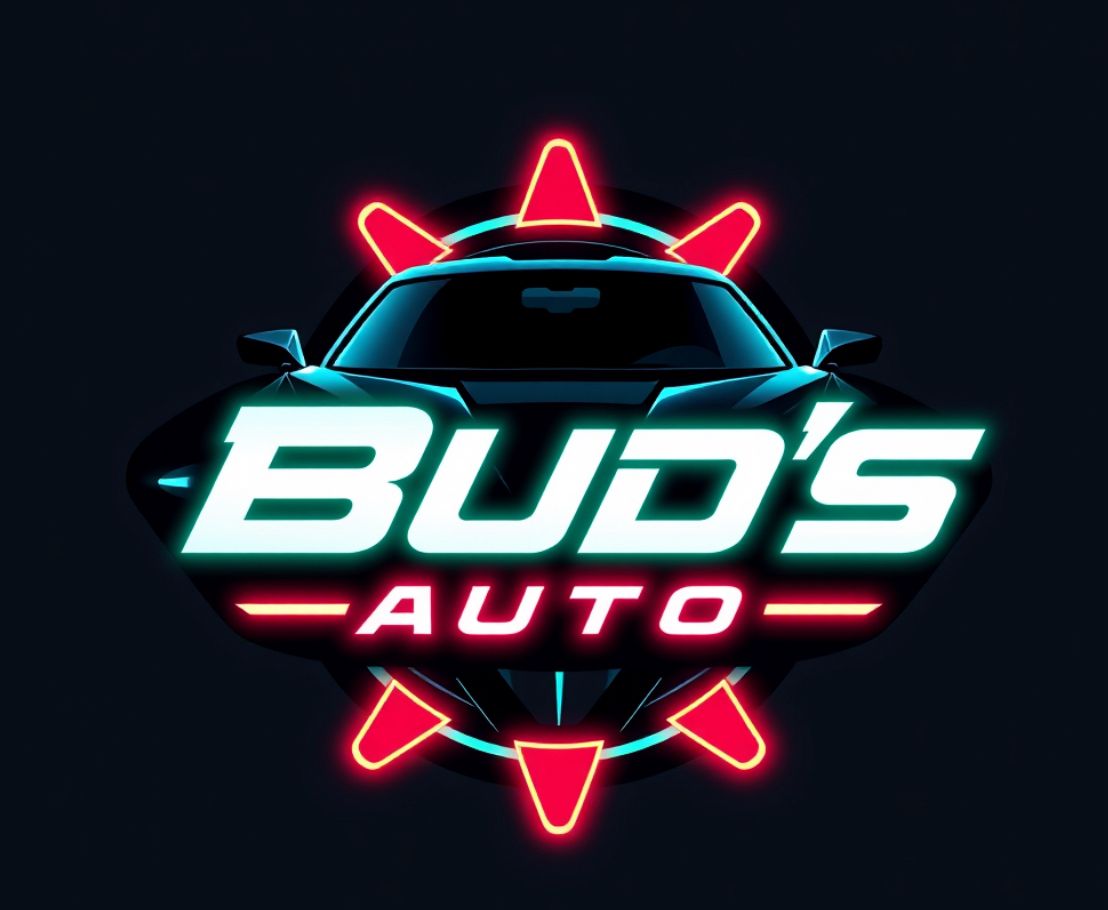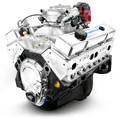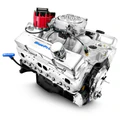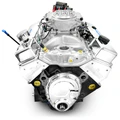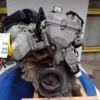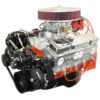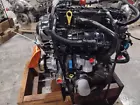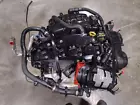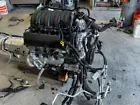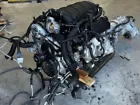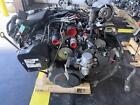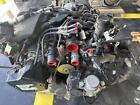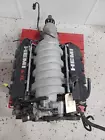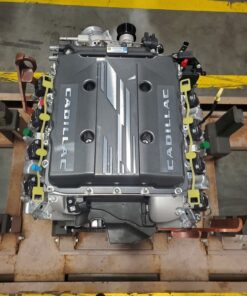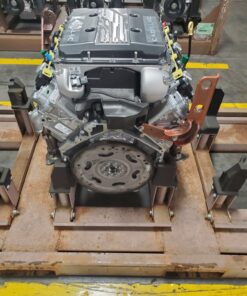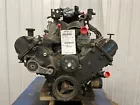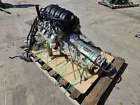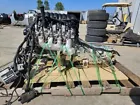The Chevrolet 350ci engine is one of the most iconic and widely used V8 engines in American automotive history, especially in GM (Chevrolet) vehicles. Here’s a detailed overview: Chevrolet 350ci engine
Basic Specs
-
Displacement: 350 cubic inches (5.7 liters)
-
Configuration: 90° V8
-
Bore x Stroke: 4.00″ x 3.48″
-
Valvetrain: OHV (Overhead Valve), 16 valves (2 per cylinder)
-
Fuel Type: Gasoline
-
Block Material: Cast iron (some aftermarket/aluminum versions exist)
-
Heads: Cast iron or aluminum (depending on trim/aftermarket)
-
Firing Order: 1-8-4-3-6-5-7-2
Performance Range of Chevrolet 350ci engine
-
Horsepower:
-
Ranged from ~145 hp (smog-era 1970s) to over 370 hp in performance versions (like the L82 or LT-1)
-
With aftermarket upgrades, many crate 350s easily exceed 400+ hp
-
-
Torque: 250–400+ lb-ft depending on build and tuning
History & Applications
-
Introduced: 1967 (in the Camaro SS)
-
Production Span: 1967–early 2000s (various forms)
-
Used In:
-
Chevrolet Camaro
-
Chevelle
-
Corvette
-
Nova
-
Monte Carlo
-
C/K trucks, Suburban, Blazer
-
GMC trucks
-
Boats, hot rods, custom builds
-
Famous Variants
| Variant | Years | Notable Features |
|---|---|---|
| L46 | 1969 | 350 hp, high-performance Corvette engine |
| LT-1 | 1970–72 | Solid-lifter cam, 360 hp (very high performance) |
| L48 | 1967–1980 | Most common base 350 |
| L82 | Mid-70s | High-output option with 210–250 hp |
| Crate 350 (GM Goodwrench) | Modern | ~195–300 hp, popular for engine swaps |
Why It’s Loved
-
Tons of aftermarket support
-
Simple and durable design
-
Endlessly upgradable
-
Cheap to maintain and rebuild
-
Ideal for hot rods, resto-mods, and custom builds
Common Mods
-
Aluminum heads
-
Roller cams
-
Holley or Edelbrock carb/intake
-
Headers and free-flow exhaust
-
Performance ignition systems
-
Turbo/supercharger kits
Common Issues (Original/Older Builds)on Chevrolet 350ci engine
-
Flat cam lobes (especially with improper oil or break-in)
-
Oil leaks (rear main seal, valve covers)
-
Overheating (especially in older or poorly maintained engines)
-
Timing chain wear
-
Carburetor issues if not maintained
Crate Engine Options
GM Performance Parts and many third-party companies still offer Chevrolet 350ci engine with modern internals and EFI options. Common crate engine options:
-
GM 350/290 HP
-
Blueprint 350 Crate (375+ hp)
-
ATK Performance 350
-
Summit Racing budget builds
Prices generally range from $2,500–$6,000, depending on power level and components.
Summary – Is the 350 a Good Engine?
Absolutely. The Chevrolet 350ci engine is a legendary engine for a reason:
-
Simple, rugged, and incredibly versatile
-
Ideal for classic cars, muscle cars, street rods, and off-road builds
-
Whether you’re restoring a ’69 Chevelle or building a custom truck, the 350 is one of the best-supported engines in history
Would you like help selecting a specific crate version, building a budget for a 350 swap, or comparing it to modern LS engines?
Absolutely — let’s dig deeper into the Chevrolet 350 c.i. engine family, including tuning tips, LS comparisons, crate engine advice, and usage in swaps.
Chevrolet 350ci engine: Performance Building Tips
If you’re looking to build or tune a Chevrolet 350ci engine here are some common performance stages:
Stage 1 – Budget Build (~250–300 hp)
-
Stock block and heads
-
Mild camshaft (e.g., Comp Cams XE262H)
-
Dual-plane intake (e.g., Edelbrock Performer)
-
600–650 CFM carburetor
-
Headers and 2.5“ exhaust
Goal: Reliable street engine, torque-rich, around 280–300 hp
Stage 2 – Street/Strip (~350–400 hp) on Chevrolet 350ci engine
-
Aluminum heads with 64cc chambers (AFR, Dart, or Edelbrock)
-
High-lift cam (e.g., Comp Cams XE274H)
-
750 CFM carb or EFI system
-
Flat-top pistons with forged rods
-
HEI ignition with MSD box
Goal: High-revving and quick, enough power to make a mid-size muscle car or classic truck fly
Stage 3 – Track or Boosted Build (400+ hp)
-
Forged rotating assembly (crank, pistons, rods)
-
High-flow aluminum heads (AFR 195cc+)
-
Roller camshaft
-
Supercharger (e.g., Weiand 177 Roots) or turbo
-
Holley Sniper EFI or MSD Atomic EFI
Goal: Build for serious street/track use — reliable 450–600+ hp possible depending on boost/fuel setup.
Chevrolet 350ci engine vs LS Engines (Like 5.3L/6.0L)
| Feature | 350 Small Block | LS-Based Engines |
|---|---|---|
| Displacement | 350 ci (5.7L) | 4.8–7.0L |
| Power Potential | 600+ hp (built) | 700+ hp (easier with boost) |
| Weight | Heavier (cast iron) | Lighter (aluminum available) |
| Tech | Carb or simple EFI | Modern EFI, coil-on-plug |
| Aftermarket Support | Excellent | Excellent |
| Swap Complexity | Easy | More wiring/fuel work |
| Cost (base) | Lower ($) | Higher upfront, more modern gains |
Verdict:
-
350: Easier to work on, cheaper to rebuild, old-school muscle.
-
LS: More efficient, more power per dollar with boost or EFI, better for modern swaps.
Crate Engine Recommendations (Based on Use Case)
| Use Case | Crate Engine | Approx. HP | Notes |
|---|---|---|---|
| Daily Driver/Classic Restore | GM Goodwrench 350 | 195 hp | Reliable base engine, ~$2,500 |
| Mild Street Rod | BluePrint 350 (BP350CTC1) | 365 hp | Strong torque, hydraulic roller cam |
| Serious Street/Strip | ATK HP89C | 400+ hp | Forged parts, aggressive cam |
| EFI Ready Swap | Summit Racing 350 w/ Sniper EFI | 330+ hp | Carb-free driving with modern tuning |
Popular Swaps Using the 350
The Chevrolet 350ci engine has been swapped into just about everything, but it’s especially common in:
-
Older GM cars/trucks (obviously)
-
Jeep CJs and Wranglers
-
Toyota pickups and Land Cruisers
-
S10s and El Caminos
-
Classic Mustangs and oddballs (with adapter kits)
-
Street rods, rat rods, hot rods
-
Boats and off-road buggies
Why? Because it’s simple, has nearly infinite aftermarket support, and doesn’t require modern sensors or electronics (unless you go EFI).
Tips for Swapping a 350
-
Transmission Matching: Pairs easily with TH350, TH400, 700R4, 4L60E (w/ controller)
-
Engine Mounts: Kits available for nearly any chassis
-
Cooling: Use a radiator for a V8 application (aluminum preferred)
-
Fuel: If going EFI, you’ll need a high-pressure fuel pump and return line
-
Wiring: Basic wiring harness is simple (HEI distributor only needs one wire to run)
Final Thoughts
The Chevrolet 350ci engine remains a go-to engine for:
-
Restorers who want old-school feel
-
Hot-rodders looking for DIY fun
-
Budget builders who want reliability without breaking the bank
